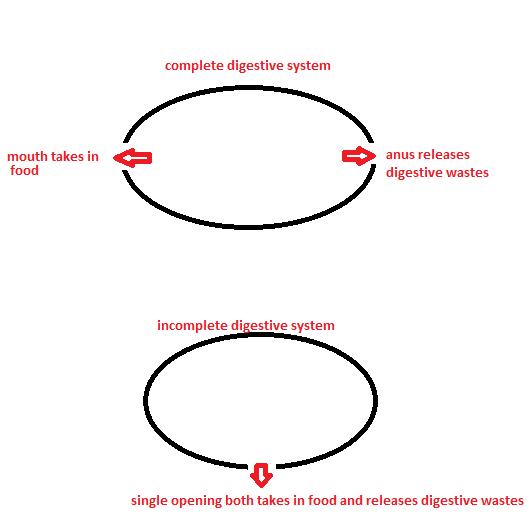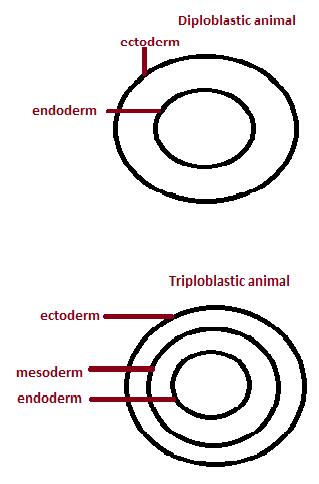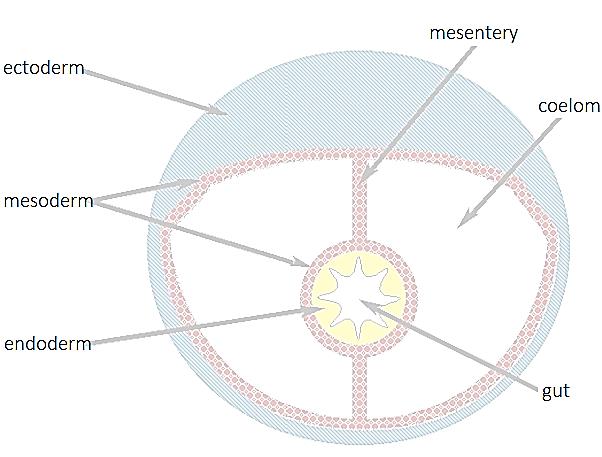NEET Biology
Animal Kingdom

Basis of classification and types of classification
- Features such as arrangement of cells, body symmetry, nature of coelom, patterns of digestive, circulatory or reproductive systems are the basis of animal classification.
Levels of Organisation
- Cellular level of organization- cells are arranged as loose cell aggregates. Example- Sponges
- Tissue level of organization- cells performing the same function are arranged into tissues. Example- coelenterates.
- Organ level of organization- tissues are grouped together to form organs, each specialized for a particular function. Example- Platyhelminthes
- Organ system level of organization- organs have associated to form functional systems, each system concerned with a specific physiological function. Example- Annelids, Arthropods, Molluscs, Echinoderms and Chordates.
- Complexities can be seen in animals with organ system level of organization.
For example-i) the digestive system in Platyhelminthes has only a single opening that serves as both mouth and anus, and is hence called incomplete digestive system, whereas a complete digestivesystem has two openings, mouth and anus.
- ii) open type circulatory system is the one in which the blood is pumped out of the heart and the cells and tissues are directly bathed in it or ,whereas closed type is the one in which the blood is circulated through arteries, veins and capillaries.

Fig. complete and incomplete digestive systems
Symmetry
- Asymmetrical- when any plane that passes through the center does not divide them into equal halves. Example- Sponges.
- Radial symmetry- When any plane passing through the central axis of the body divides the organism into two identical halves. Example- Coelenterates, Ctenophores etc.
- Bilateral symmetry- When the body can be divided into identical left and right halves in only one plane. Example- Annelids, Arthropods, etc.
Diploblastic and Triploblastic Organisation
- Diploblastic animals- Animals in which the cells are arranged in two embryonic layers, an external ectoderm and an internal endoderm. Example- coelenterates
- Triploblastic animals- Animals in which the developing embryo has a third germinal layer, mesoderm, in between the ectoderm and endoderm. Examples- platyhelminthes to chordates

Fig. diploblastic and triploblastic organization
Coelom
- The body cavity, which is lined by mesoderm is called coelom.
- Animals possessing coelom are called coelomates. Examples- annelids, molluscs etc.
- The body cavity is not lined by mesoderm, instead, the mesoderm is present as scattered pouches in between the ectoderm and endoderm, such a body cavity is called pseudocoelom and the animals possessing them are called pseudocoelomates. Examples- Aschelminthes
- The animals in which the body cavity is absent are called acoelomates. Examples- Platyhelminthes

Fig. Coelom
Segmentation
- Segmentation is the process of dividing the body externally and internally into segments with a serial repetition of at least some organs.
For example- In earthworm, the body shows called metameric segmentation and the phenomenon is known as metamerism.

Fig. metameric segmentation in earthworm
Notochord
- Notochord is a mesodermally derived rod-like structure formed on the dorsal side during embryonic development.
- Animals with notochord are called chordates and those animals which do not form this structure are called non-chordates. Examples- porifera to echinoderms.

Fig. notochord
Types of classification
- Animals are classified based on arrangement of cells, body symmetry, nature of coelom, patterns of digestive, circulatory or reproductive system.
- Animal kingdom is classified into various phylums such as Phylum Porifera, Phylum Coelenterata (Cnidaria), Phylum Ctenophore, Phylum Platyhelminthes, Phylum Aschelminthes, Phylum Annelida, Phylum Arthropoda, Phylum Mollusca, Phylum Echinodermata, Phylum Hemichordata and Phylum Chordata.
NEET Biology Animal Kingdom NCERT Chapter 4 Free Notes for Best Revision
Revision of NEET Biology Animal Kingdom is a crucial aspect of effective learning. Revision plays a vital role in the learning process and is especially important before exams. Here are some key points you can consider emphasizing in your content:
- Retention and Memory: Regularly reviewing and revisiting the material of NEET Biology Animal Kingdom helps reinforce the concepts in students' minds. It strengthens memory pathways, making it easier to recall information during exams and beyond.
- Consolidation of Knowledge: When you revise notes, you are essentially consolidating your knowledge. This means connecting new information with what you already know, making the overall understanding more robust.
- Identifying Knowledge Gaps: Revision allows students to identify any gaps in their understanding or areas where they need further clarification. This gives you a chance to seek help or delve deeper into those topics. For detailed understanding, you can always refer to the videos of Animal Kingdom NEET Biology NCERT Chapter 4 on LearnoHub.com
- Building Confidence: As you revise Animal Kingdom NEET Biology and become more familiar with the content, your confidence in your abilities grows. Confidence is a crucial factor in exam performance as it reduces anxiety and allows you to approach exams with a positive mindset.
- Different Revision Techniques: Use a variety of revision techniques such as summarizing notes, creating flashcards, practicing past papers, discussing concepts with peers, and teaching others. Different techniques work for different students, and it's essential to find what suits you the best. You can also attend the LIVE Revision classes on LearnoHub.com or watch the LIVE Revision Race videos of LearnoHub on Animal Kingdom NEET Biology NCERT Chapter 4.
- Spacing Effect: Spacing out revision sessions over time, rather than cramming all at once, has been shown to improve long-term retention. Create a revision schedule leading up to the exams to allow for spaced practice.
- Regular Revision over Cramming: Regular and consistent revision throughout the academic year is very important. Waiting until the last moment to cram everything can be overwhelming and less effective than spaced-out revision.
- Self-Assessment: Assess your understanding periodically through quizzes or self-tests. This helps you to gauge your progress and identify areas that need further attention. Refer NEET Animal Kingdom Online Tests.
- Balanced Approach: Remind students to strike a balance between revision and other activities. Adequate rest, exercise, and relaxation are essential for optimal learning and performance.
- Seeking Help: If you face difficulties during the revision process, Refer the videos of NEET Biology Animal Kingdom. Clearing doubts promptly is crucial for a better grasp of the subject matter. You can always ask your doubts on Animal Kingdom NEET Biology NCERT Chapter 4. “Ask a Question” section of LearnoHub.com
By highlighting the benefits and strategies of effective revision, you can approach your studies more mindfully and achieve better results in your exams. Best of luck bachhon!
NEET Biology seems to be a quite difficult subject for a lot of students. But, if you get a very good conceptual understanding of the subject, it can be very interesting for you.
We, at LearnoHub, will give our best to make NEET Biology Animal Kingdom NCERT Chapter 4 super-duper easy for you.
We aim at making learning fun as well as engaging for you with our complete end-end learning content with Animal Kingdom NEET Biology Best videos, Notes, NCERT pdf, NCERT complete syllabus, tests and Practice Questions.
Always remember, it is very important to study with full concentration during Revision. Here are a few tips for you on how to revise with full focus:
- Create a Distraction-Free Environment: Find a quiet and comfortable place to study where you can minimize distractions. Turn off or silence your phone, log out of social media accounts, and inform others around you that you need uninterrupted study time. A dedicated study environment will help you focus better.
- Set Specific Goals: Before starting your study session, set clear and achievable goals. Break down your study material into smaller tasks, and plan what you want to accomplish during each session. Having specific goals will give you a sense of direction and purpose, making it easier to concentrate.
- Use the Pomodoro Technique: The Pomodoro Technique is a time management method that involves studying in short, focused intervals, typically 25 minutes, followed by a short break of 5 minutes. After completing four sessions, take a longer break of around 15-30 minutes. This technique can improve focus and productivity by providing regular breaks to recharge.
- Stay Organized: Keep your study materials, notes, and resources well-organized. Having everything you need at hand will save time and reduce distractions caused by searching for materials. Use color-coded folders or digital tools to maintain a structured study system.
- Practice Mindfulness and Meditation: Before you begin studying, take a few minutes to practice mindfulness or meditation. Deep breathing exercises and clearing your mind of distractions can help you approach your study session with a calm and focused mindset.
Remember, studying with full concentration is a skill that takes time and practice to develop. If you find your mind wandering during study sessions, gently bring your focus back to the task at hand and be patient with yourself. With consistent effort, you can improve your ability to concentrate and make the most of your study time.
Last but not the least, To get the best hold on NEET Biology Animal Kingdom Book Chapter 4. Do not forget to check out:
- Animal Kingdom NEET Biology Best videos
- Animal Kingdom NEET Biology NCERT Solutions
- NEET Biology Animal Kingdom Revision notes
- Animal Kingdom NEET Biology DPPS, Download PDF of solutions
- NEET Biology Animal Kingdom Online Tests
- NEET Biology Sample papers